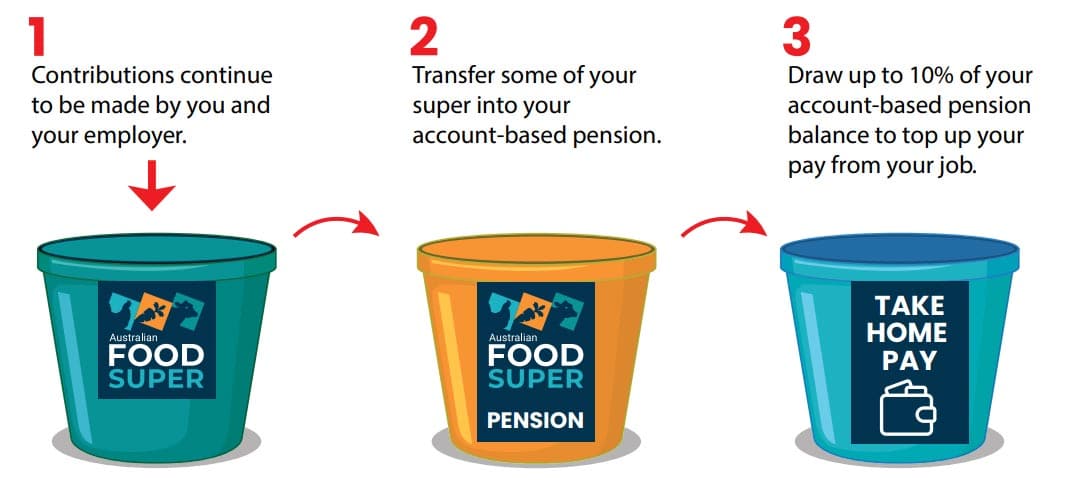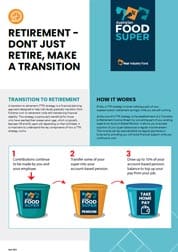TRANSITION TO RETIREMENT
A transition to retirement (TTR) strategy is a financial planning
approach designed to help individuals aged 60 or older gradually transition from full-time work to retirement while still maintaining financial stability. It is important to understand the key components of how a TTR strategy works.
HOW IT WORKS
Firstly, a TTR strategy involves utilising a part of your superannuation (retirement savings) while you are still working.
At the core of a TTR strategy is the establishment of a Transition to Retirement Income Stream by converting part of your existing super to an Account Based Pension. It allows you to access a portion of your super balance as a regular income stream. This income can be received either as regular payments or lump sums, providing you with extra financial support while you continue to work.

REDUCE WORKING HOURS.
One of the main reasons people choose to implement a TTR strategy is to reduce their working hours gradually. As you approach retirement age, you may want to work fewer hours or transition to part-time employment. By supplementing your reduced salary with income from the Account Based Pension, you can maintain your standard of living without relying solely on your employment income.
POTENTIAL TAX SAVINGS.
Another significant benefit of a TTR strategy is the potential tax advantages it offers. Superannuation funds in Australia are subject to concessional tax rates, which are generally lower than individual income tax rates. By receiving income from your super fund through an account based pension, you may pay less tax compared to receiving the same income from employment.
TAX FREE WITHDRAWALS AFTER 60.
Additionally, as you must be at least 60 years of age to open a TTR, any withdrawals you make from your superannuation are tax-free. This means that if you continue working while receiving income from your account-based pension and accessing your super, you can potentially reduce your overall tax liability.
KEEP YOUR SUPER GROWING.
It’s important to note that while you are implementing a TTR strategy, your remaining super balance continues to accumulate and grow through investment returns. This means that even though you are accessing some of your retirement savings early, the remainder of your superannuation fund has the opportunity to grow over time.
In addition, while you are still working, your employer will continue to make contributions to your super and you can also contribute extra through salary sacrifice or after tax contributions.
These two factors can help boost your retirement savings and provide you with a more comfortable financial future.
WHAT HAPPENS WHEN YOU STOP WORKING COMPLETELY?
When you eventually reach retirement age, which is currently set at 65 or older, you have several options regarding your superannuation. You can choose to access your remaining super balance as a lump sum, or you can convert it into an account-based pension. An account-based pension provides you with a regular income stream during your retirement years, helping to support your lifestyle without the need for additional employment income.
In summary, a transition to retirement strategy in Australia is a flexible and tax-effective approach to transitioning from full-time work to retirement. By accessing a portion of your superannuation through an account-based pension while still working, you can reduce your working hours, supplement your income, and potentially lower your tax liability. This strategy allows you to gradually adjust to retirement while maintaining financial stability and security for the future.
For advice on whether a TTR strategy suits your circumstances, call our Hotline on 1800 808 614 to speak with a financial planner.

Some things to consider with a transition to retirement pension and salary sacrifice strategy:
- You may be able to save more for your retirement income goals and objectives by putting more into super.
- Earnings within the pension environment are tax free once you have met a “condition of release” while superannuation earnings incur a tax of up to 15%.
- The amount you draw from your pensionwill be tax-free.
- In general salary sacrifice super contributions are taxed at 15% (upon entry to the fund) instead of marginal tax rates which can be as high as 49% (including Medicare levy).
- Pension income is restricted to a maximum annual pension income of 10% until such time as you have met a condition of release.
- There are limits on concessional contributions (such as superannuation guarantee, salary sacrifice, etc) that can be made per financial year.
As all financial circumstances are different you should seek advice that is suitable for your situation.
Call our Member Hotline on 1800 808 614 for a copy of our Pension PDS or explore our website.
CONDITIONS OF RELEASE
All contributions made to a superannuation fund from 1 July 1999 are classified as Preserved. Some contributions made prior to this date may be Preserved, Restricted Non-Preserved or Unrestricted. To apply for payment of any Preserved amount or be eligible for a tax exemption on pension earnings you must have met one of the following conditions of release:
- Permanently retired from the workforce on or after age of 60, or
- Ceased employment with a participating employer after age 60 (if you go back to work any new contributions will be preserved until you reach a condition of release) or
- Reached age 65, or
- Died (where your benefits are paid to your dependants or estate), or
- Suffering from a Terminal Illness that is likely to result in your death within 24 months¥, or
- Met the conditions for release due to Severe Financial Hardship or Compassionate Grounds (approved by the Department of Human Services; see the Department of Human Services website for more details), or
- Become totally and permanently incapacitated, or
- Left your job and your Preserved benefit is less than $200.
# Salary sacrifice is a method of making super contributions from your gross income. Your money enters the super fund as an Employer Contribution and is only taxed at a maximum of 15% (not your marginal tax rate). As a result, your taxable income may be decreased and more money will enter the fund. Your employer must agree to allow you to salary sacrifice and you should check if they will still then pay your Super Guarantee, leave payments and other entitlements on your before salary sacrifice income. You may wish to seek financial advice to check if salary sacrifice is the right thing for you to do.
*Please refer to the Australian Food Super Superannuation Payments Fact Sheet at www.ausfoodsuper.com.au/fact-sheets/ for details of Conditions of Release.
¥ For terminal illness the account balance may be released if life expectancy is less than 24 months. However, for the early release of life insurance benefits, life expectancy must be less than 12 months.
Download the Fact Sheet
Retirement – Don’t just retire, make a transition
If you require any assistance, or would like a printed copy of this or any fact sheet, please contact the Member Hotline on 1800 808 614


